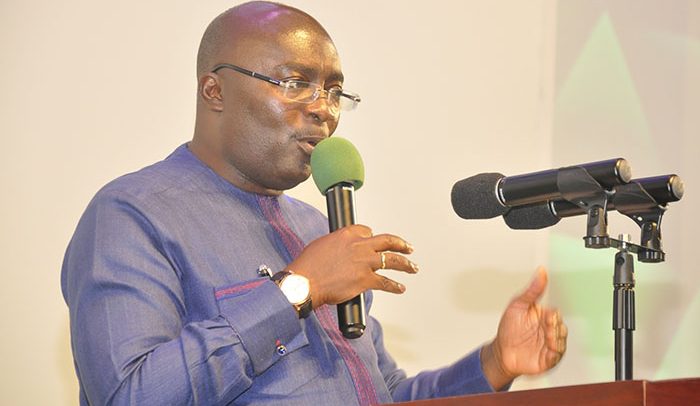Vice-President Dr. Mahamudu Bawumia
Vice-President Dr. Mahamudu Bawumia has explained why government decided to redirect public spending following the outbreak of the Covid-19 pandemic.
Speaking at the launch of the Ghana Priorities Project in Accra yesterday, the Senior Advisor and Secretary and Member of Ghana’s Economic Management Team, Dr. Joe Amoako Tuffuor, who represented the Vice-President, said government had to take that decision because ‘trade-offs are consequential in human lives.’
With strained resources, he noted that medical practitioners have been compelled to ‘choice-making’ knowing all too well that some of their choices could potentially have ‘tragic outcomes.’
“It is in response to some of these choices that we face as a country that government is embarking on the largest investment by any government in our healthcare infrastructure by the commitment to construct 88 standard design 100-bed hospitals in districts without hospitals, seven new regional hospitals in the six new regions, two new psychiatric hospitals, infectious disease centres for each of the three ecological zones,” the Vice-President’s representative emphasized.
He said “some of the public choices have been made easier not because of the abundance of resources, but because the pandemic has also uncovered a rare patriotic response in recent memory.”
That, he said, was part of reasons the President’s famous ‘fellow Ghanaians’ would become the national call for cohesion, igniting patriotism, and rallying consensus in public choices and the need to increase the country’s collective preparedness in dealing with public health crisis.
The Vice-President’s representative said “Covid-19 puts all of us at risk, and it is our collective responsibility to do all we can to fight this pandemic” with everyone still unsure what the new norms of social interactions, work and play will be.
At the basic human level, he noted “there is nothing to be gained to unpack government’s efforts in this direction for any short-term gains hence the need to find answers together.”
That notwithstanding, Dr. Tuffuor indicated that “government was under no illusion that even these rapid measures would be enough because of the rapidly changing nature of the problem in front of us and that with hindsight, we can unpack the cost-benefit analysis of each of these initiatives.”
He was, however, quick to admit that “Covid-19 has uncovered some of the structural challenges in our healthcare delivery system in terms of access and in our capabilities, and in terms of the reach and robustness of social equity instruments, altering our priorities in the allocation of public spending (sic).”
“Yes, we have had to ramp up our human capital training from nurses to medical technicians and post graduate medical training of doctors and recruited 65,000 new healthcare personnel,” he stated.
He, therefore, noted that the Ghana’s Priorities Project could not have come at a better time.
The Ghana Priorities Project is a research and advocacy project that analyzes and promotes investments to establish how to achieve the most social, environmental and economic good for Ghana with cedis spent.
It uses the Copenhagen Consensus Centre approach, a project that seeks to establish priorities for advancing global welfare using methodologies based on the theory of welfare economics, using cost–benefit analysis refined over the past 10 years to improve global and national spending priorities.
This project involves hundreds of sector experts, many months of research, and engagement with decision-makers on the most incisive development approaches for Ghana.
By Charles Takyi-Boadu, Presidential Correspondent

